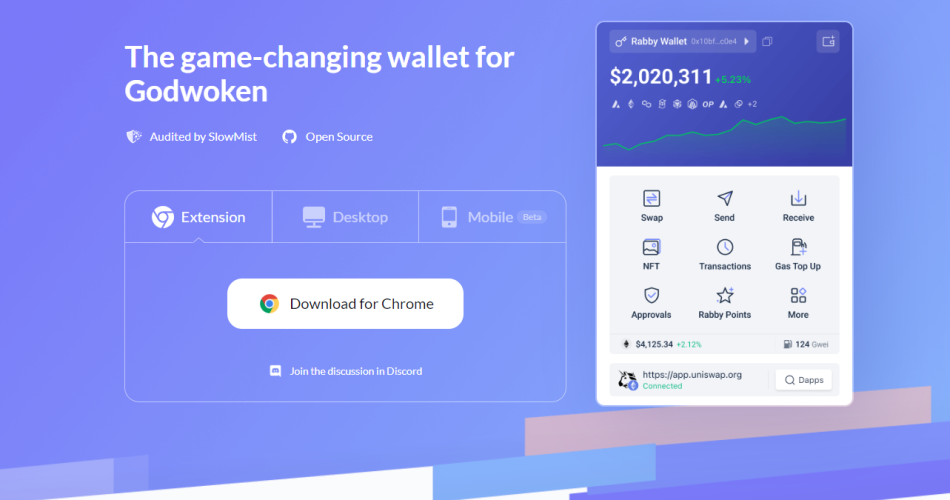In the rapidly evolving world of Decentralized Finance (DeFi), a user-friendly and secure wallet is paramount. Enter Rabby Wallet, an open-source, browser-based crypto wallet specifically designed for the DeFi ecosystem. This in-depth review, informed by the latest data and financial expertise, explores Rabby’s key features, functionality, and its place within the wider DeFi landscape.
Designed for DeFi
- Multi-Chain Support: Seamlessly navigate across diverse blockchains like Ethereum, Polygon, Avalanche, Arbitrum, and Fantom. Rabby automatically detects and connects to the appropriate network based on the dApp you’re using.
- Security-First Approach: Rabby prioritizes user safety with its built-in security engine. Pre-transaction checks scan for potential risks, notifying you of suspicious activity before confirming transactions.
- Enhanced Transparency: Gain clear insights into your DeFi experience. Rabby displays estimated balance changes pre-transaction, helping you make informed decisions.
- Intuitive Interface: Rabby boasts a user-friendly interface, simplifying complex interactions within the DeFi space. Easily navigate between functionalities and manage your digital assets effortlessly.

Key Features
- Connect to dApps: Interact with a vast array of DeFi protocols directly from your Rabby Wallet. The integrated dApp browser eliminates the need for switching between platforms.
- Token Management: Securely store, send, and receive various cryptocurrencies and tokens supported by the connected blockchains.
- Wallet Management: Create and manage multiple wallets within Rabby, keeping your finances organized and segregated.
- Advanced Features: For experienced users, Rabby offers advanced functionalities like custom RPC endpoints, transaction signing, and seed phrase support.
Strengths:
- Multi-chain capabilities: Rabby excels in its multi-chain support, offering broad compatibility and eliminating the need for multiple wallets.
- Security features: The pre-transaction checks and transparent information contribute to a more secure DeFi experience.
- User-friendly design: Rabby’s intuitive interface makes it accessible to both DeFi novices and seasoned users.
Considerations:
- Browser-based: Unlike mobile wallets, Rabby is currently limited to browser use, potentially less convenient for on-the-go transactions.
- No fiat on-ramp: Rabby doesn’t directly support purchasing crypto with fiat currency, requiring users to utilize external services.
- Emerging token: Rabby doesn’t have its token yet, but a points program hints at future rewards.
Rabby Wallet packs several unique features that position it as a standout option in the DeFi wallet space. Here’s a closer look at what sets it apart:
1. Multi-Chain Mastery: Unlike many wallets limited to Ethereum or specific chains, Rabby seamlessly supports 44 different blockchains. This means you can access dApps across diverse ecosystems like Polygon, Avalanche, Arbitrum, Fantom, and more, all from one unified platform. It automatically detects the necessary chain based on the dApp you’re using, eliminating the need for multiple wallets and simplifying cross-chain exploration.
2. Security Sentinel: Safety is paramount in DeFi, and Rabby takes it seriously. Its built-in security engine acts as a vigilant guardian, performing pre-transaction checks to identify potential risks. You’ll receive alerts for suspicious activity, like unknown contracts or high gas fees, empowering you to make informed decisions before confirming transactions.
3. Transparency Triumphs: Rabby empowers you with enhanced transparency throughout your DeFi journey. It goes beyond simply displaying your current balance. You’ll see estimated balance changes before confirming any transaction, enabling you to understand the exact impact of your actions and avoid unintended consequences. This level of clarity fosters trust and informed decision-making.
4. Advanced Arsenal: While offering a beginner-friendly interface, Rabby caters to experienced users with its advanced features. You can utilize custom RPC endpoints to connect to niche blockchains, conduct transactions using seed phrase import, and leverage tools for more granular control over your DeFi experience.
5. Address Organization Extravaganza: Tired of juggling numerous addresses? Rabby offers a unique address sorting and management system. You can create and categorize addresses based on their purpose, like DeFi protocols, NFTs, or cold storage. This facilitates easy organization and identification, streamlining your interactions within the DeFi world.
Bonus Feature: While not officially released yet, Rabby’s points program hints at a future token and potential rewards for wallet users. This adds an exciting layer of value and community engagement to the platform.

Getting Started with Rabby Wallet: A Step-by-Step Guide
Ready to experience the DeFi world with Rabby Wallet? Follow these steps to set up your wallet and unlock its potential:
1. Download and Install:
- Head to the Rabby Wallet website (https://rabby.io/) and choose the appropriate browser extension for your preferred browser (Chrome, Firefox, Brave, etc.).
- Click “Download” and follow the on-screen instructions to install the extension.
2. Create or Import:
- Upon opening the extension, you’ll be prompted to choose between creating a new wallet or importing an existing one.
- Creating a new wallet: Generate a strong password and carefully write down your 12-word seed phrase. This phrase is crucial for recovering your wallet, so store it securely and never share it with anyone.
- Importing an existing wallet: Choose the import method (e.g., private key, seed phrase) and provide the necessary information to transfer your existing wallet and its contents to Rabby.
3. Connect to Chains:
- Rabby automatically detects and connects to supported chains based on the dApp you’re using. However, you can manually add specific chains or testnets if needed. Click the network icon in the extension and explore the available options.
4. Explore dApps:
- Click the “Discover” tab to browse a curated list of popular dApps across various chains.
- Click on a dApp to launch it directly within the Rabby interface. Connect your wallet to the dApp by following the on-screen instructions.
5. Manage Your Assets:
- The “Portfolio” tab displays your balances across all connected chains. Click on a specific token to view details like transaction history and available actions (e.g., send, receive, swap).
- Click “Add new address” to create additional addresses for specific purposes within your wallet.
6. Utilize Advanced Features:
- For experienced users, the “Settings” tab offers advanced options like custom RPC endpoints, transaction signing with your seed phrase, and managing multiple wallets within Rabby.
Additional Tips:
- Always double-check dApp URLs before interacting with them to avoid phishing scams.
- Familiarize yourself with specific blockchain fees before making transactions.
- Consider connecting Rabby to a hardware wallet for added security.
- Keep your seed phrase safe and never share it with anyone.
Rabby has several notable competitors in the DeFi wallet space, each with its strengths and weaknesses. Here’s a comparison of Rabby against some key rivals:
| Competitor | Strengths | Weaknesses | Comparison to Rabby |
|---|---|---|---|
| MetaMask: | – Most popular DeFi wallet – Extensive dApp support – Mobile app option | – Single-chain (Ethereum) focused – Limited security features – Less user-friendly interface | Rabby offers multi-chain support, enhanced security features, and a more intuitive interface. |
| Phantom Wallet: | – Optimized for Solana ecosystem – Sleek and user-friendly interface – On-chain governance participation | – Limited chain support (primarily Solana) – Lacks advanced features | Rabby provides broader chain support, advanced features, and security checks not found in Phantom. |
| Coinbase Wallet: | – User-friendly mobile app – Integration with Coinbase exchange – Advanced security features | – Primarily supports Ethereum and few other chains – Higher fees compared to some competitors | Rabby offers multi-chain support at lower fees and a more focused DeFi experience. |
| AlphaWallet: | – Open-source and community-driven – Supports Ethereum and ERC-based tokens – Mobile app and Chrome extension options | – Limited to Ethereum ecosystem – Lacks advanced features like Rabby’s security checks | Rabby provides multi-chain support and security enhancements not found in AlphaWallet. |
Here are some additional points to consider when choosing a DeFi wallet:
- Security: Prioritize wallets with robust security features like transaction checks, multi-signature options, and hardware wallet compatibility.
- Chain support: If you plan to explore diverse DeFi ecosystems, Rabby’s multi-chain capabilities offer a clear advantage.
- User interface: Choose a wallet with a clear and intuitive interface that suits your comfort level.
- Mobile access: If on-the-go access is important, consider wallets with mobile apps like MetaMask or Coinbase Wallet.
- Reputation and community: Opt for wallets with a good track record and active communities for support and updates.
Remember, the best DeFi wallet for you depends on your individual needs and priorities. Conduct your research, compare features, and choose the one that aligns best with your DeFi journey.
Partnerships
Rabby Wallet primarily positions itself as a standalone platform for accessing the DeFi ecosystem, and therefore doesn’t have many formal partnerships in the traditional sense. However, they do participate in the broader DeFi community and collaborate with various projects through integrations and ecosystem initiatives. Here are some noteworthy connections:
1. Alchemy: Rabby is listed as a “Launch Partner” and “Growth Customer” on Alchemy’s website, which suggests they utilize Alchemy’s infrastructure and development tools for certain functionalities within the wallet.
2. WAGBI (Women and Girls in Blockchain): Rabby was a participant in the WAGBI “WEB3 30” competition, recognizing emerging leaders in the Web3 space, highlighting their commitment to diversity and inclusion within the industry.
3. Various dApps: While not official partnerships, Rabby integrates seamlessly with numerous DeFi protocols across various chains. By supporting and enabling interactions with these dApps, they contribute to the wider DeFi ecosystem.
4. Open-source community: Rabby operates as an open-source project, fostering collaboration and contributions from developers within the wider Web3 community. This fosters innovation and continuous improvement within the wallet.
5. Future considerations: While Rabby currently focuses on providing a direct wallet solution, partnerships with exchanges, security providers, or educational platforms could be potential avenues for future collaboration and expansion.
Conclusion
Rabby Wallet positions itself as a strong contender in the DeFi wallet landscape. Its focus on security, user experience, and multi-chain compatibility makes it an attractive option for those seeking a smooth and secure DeFi journey. As the project continues to evolve, offering mobile accessibility and fiat on-ramp integration could solidify its position as a leading player in the ever-growing DeFi ecosystem.
